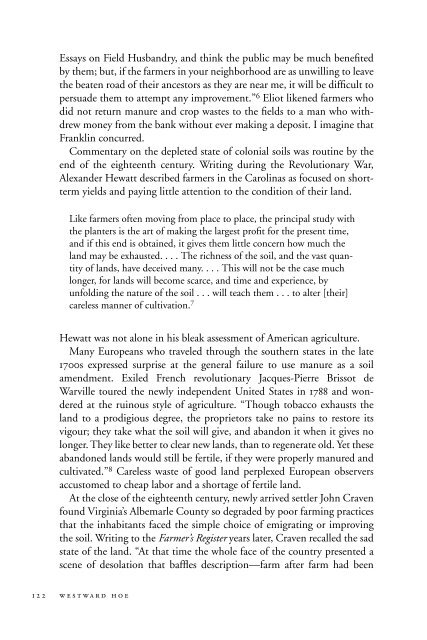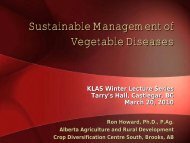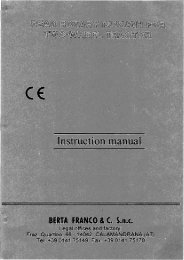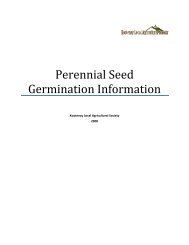Dirt: The Erosion of Civilizations - Kootenay Local Agricultural Society
Dirt: The Erosion of Civilizations - Kootenay Local Agricultural Society
Dirt: The Erosion of Civilizations - Kootenay Local Agricultural Society
Create successful ePaper yourself
Turn your PDF publications into a flip-book with our unique Google optimized e-Paper software.
122<br />
Essays on Field Husbandry, and think the public may be much benefited<br />
by them; but, if the farmers in your neighborhood are as unwilling to leave<br />
the beaten road <strong>of</strong> their ancestors as they are near me, it will be difficult to<br />
persuade them to attempt any improvement.” 6 Eliot likened farmers who<br />
did not return manure and crop wastes to the fields to a man who withdrew<br />
money from the bank without ever making a deposit. I imagine that<br />
Franklin concurred.<br />
Commentary on the depleted state <strong>of</strong> colonial soils was routine by the<br />
end <strong>of</strong> the eighteenth century. Writing during the Revolutionary War,<br />
Alexander Hewatt described farmers in the Carolinas as focused on shortterm<br />
yields and paying little attention to the condition <strong>of</strong> their land.<br />
Like farmers <strong>of</strong>ten moving from place to place, the principal study with<br />
the planters is the art <strong>of</strong> making the largest pr<strong>of</strong>it for the present time,<br />
and if this end is obtained, it gives them little concern how much the<br />
land may be exhausted. ...<strong>The</strong> richness <strong>of</strong> the soil, and the vast quantity<br />
<strong>of</strong> lands, have deceived many. ...This will not be the case much<br />
longer, for lands will become scarce, and time and experience, by<br />
unfolding the nature <strong>of</strong> the soil ...will teach them ...to alter [their]<br />
careless manner <strong>of</strong> cultivation. 7<br />
Hewatt was not alone in his bleak assessment <strong>of</strong> American agriculture.<br />
Many Europeans who traveled through the southern states in the late<br />
1700s expressed surprise at the general failure to use manure as a soil<br />
amendment. Exiled French revolutionary Jacques-Pierre Brissot de<br />
Warville toured the newly independent United States in 1788 and wondered<br />
at the ruinous style <strong>of</strong> agriculture. “Though tobacco exhausts the<br />
land to a prodigious degree, the proprietors take no pains to restore its<br />
vigour; they take what the soil will give, and abandon it when it gives no<br />
longer. <strong>The</strong>y like better to clear new lands, than to regenerate old. Yet these<br />
abandoned lands would still be fertile, if they were properly manured and<br />
cultivated.” 8 Careless waste <strong>of</strong> good land perplexed European observers<br />
accustomed to cheap labor and a shortage <strong>of</strong> fertile land.<br />
At the close <strong>of</strong> the eighteenth century, newly arrived settler John Craven<br />
found Virginia’s Albemarle County so degraded by poor farming practices<br />
that the inhabitants faced the simple choice <strong>of</strong> emigrating or improving<br />
the soil. Writing to the Farmer’s Register years later, Craven recalled the sad<br />
state <strong>of</strong> the land. “At that time the whole face <strong>of</strong> the country presented a<br />
scene <strong>of</strong> desolation that baffles description—farm after farm had been<br />
w estward hoe






